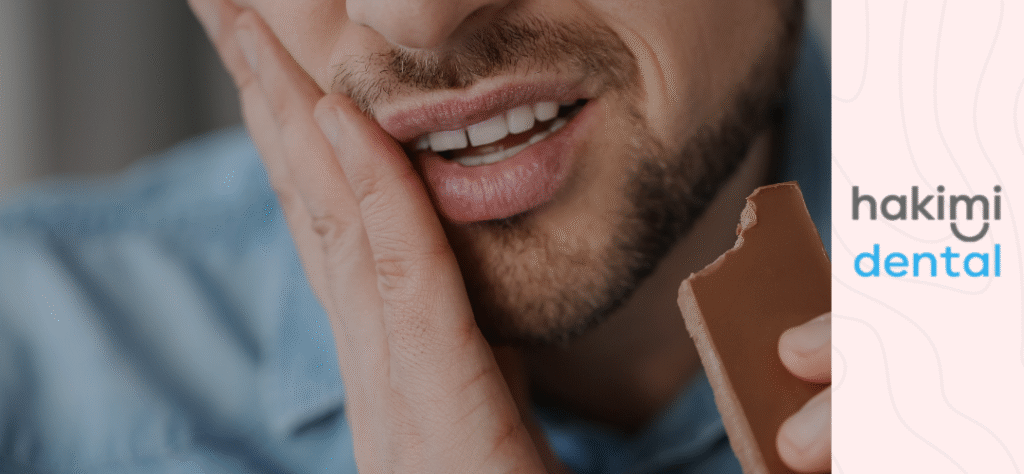If you’ve ever felt a sharp twinge in your teeth while eating ice cream, drinking a hot drink or even just breathing in cold air, you’re not alone. Sensitive teeth affect a large number of people at some point, and while it’s often manageable, it can become a daily frustration.
At Hakimi Dental Clinic in Oldbury, we regularly help patients with sensitive teeth treatment that targets the cause and brings real relief. Whether your teeth are sensitive to cold, feel uncomfortable after whitening, or have flared up following a filling, understanding the causes and solutions is the first step to getting back to normal.

What are sensitive teeth?
Tooth sensitivity occurs when the protective enamel wears down or the gums recede, exposing the underlying dentine layer of your teeth. This dentine contains tiny tubules that lead directly to the nerve, making your teeth more reactive to hot, cold, sweet or acidic triggers.
According to the Oral Health Foundation, around 1 in 3 adults in the UK experience sensitivity at some point in their lives.
Common causes of sensitive teeth
Understanding what’s behind the problem can help prevent it getting worse. Common reasons for sensitive teeth include:
- Enamel erosion from brushing too hard or using a hard-bristled toothbrush
- Tooth grinding (bruxism), especially at night
- Gum recession, often linked to gum disease
- Cracked teeth or fillings
- Acidic food and drink, which can wear away enamel
- Recent dental treatment, such as fillings or whitening
More information about the biological causes can be found on the Sensodyne official site.
Teeth sensitive to cold: a common complaint
One of the most frequent triggers we see is when teeth are sensitive to cold—whether it’s cold air, food or drinks. This is usually due to exposed dentine or microcracks in the enamel that allow temperature changes to affect the tooth nerve.
This kind of discomfort shouldn’t be ignored, especially if it becomes more frequent or intense over time. A dentist can assess whether the cause is wear, gum recession, or something more serious like decay or a hairline crack.
Sensitive teeth after filling: is it normal?
It’s not unusual to experience sensitive teeth after a filling, especially if the decay was close to the nerve. This type of sensitivity typically lasts for a few days to a couple of weeks and should gradually improve.
However, if your tooth remains sensitive long after the filling, it may mean that the filling is too high, the nerve is inflamed, or the bite needs adjusting.
In any case, if you’re experiencing discomfort post-treatment, we recommend booking a check-up with our team to ensure everything is healing as it should.
Sensitive teeth after a filling
Sensitive teeth after whitening is another common concern. Whitening products can temporarily expose the inner tooth layer, leading to increased sensitivity. This often subsides within 48 hours, but using sensitive-tooth toothpaste and avoiding very hot or cold foods can help.
If you’re considering whitening treatment, it’s best done under professional supervision. At Hakimi Dental Clinic, we offer advice and alternatives that reduce discomfort while still giving excellent results.
Sensitive teeth treatment options
There isn’t a one-size-fits-all solution. Effective sensitive teeth treatment depends on the underlying cause. Some of the options include:
1. Desensitising toothpaste
Using a high-quality toothpaste for sensitive teeth (like Sensodyne or Colgate Sensitive) helps block pain signals. It can take a few weeks of consistent use to notice results.
For more information, Colgate offers a helpful comparison between sensitive teeth and sensitive gums.
2. Fluoride varnish or sealant
At your check-up, your dentist may apply a fluoride gel or desensitising agent to the affected teeth, sealing off the exposed dentine.
3. Dental bonding
If the enamel loss is visible or the tooth surface is worn, bonding can protect the tooth and reduce sensitivity.
4. Treating gum disease
If gum recession is causing the problem, addressing inflammation through a scale and polish or deep cleaning with a dental hygienist may help resolve the sensitivity.
5. Night guards
If you grind your teeth at night, wearing a custom-made night guard can protect the enamel and prevent sensitivity caused by microtrauma.
How to help sensitive teeth at home
Looking after your teeth properly at home can go a long way in managing sensitivity. Here’s how to help sensitive teeth day-to-day:
- Use a soft-bristled toothbrush
- Brush gently using circular motions, not side-to-side
- Use a non-abrasive, fluoride toothpaste for sensitivity
- Avoid acidic foods and drinks (fizzy drinks, citrus, vinegar)
- Don’t brush immediately after eating or drinking acidic things
- Keep up with routine dental visits
If you’re unsure which products are safe or helpful, our team can offer advice during your next appointment.
Need help with sensitive teeth?
If you’re struggling with sensitive teeth, don’t ignore it. Sensitivity can be a sign of underlying issues — and there are effective ways to treat it.
At Hakimi Dental Clinic in Oldbury, we provide professional advice, in-practice treatments and personalised care plans to help you feel more comfortable and confident in your smile.
👉 Book your dental check-up today
or call our friendly team to find out how we can help.
FAQs - tooth sensitivity
Cold sensitivity often happens when enamel wears down or gums recede, exposing the sensitive dentine beneath. It can also be a sign of tooth damage or decay.
Yes, sensitive teeth after whitening is common but usually temporary. Use a sensitive-tooth toothpaste and avoid extreme temperatures for a few days.
Sensitive teeth after filling usually settle within 1–2 weeks. If discomfort continues, it could be due to bite alignment or nerve irritation and should be checked.
This depends on the cause. Toothpaste, fluoride applications, or dental bonding may all help. A dental check-up is the best way to find out what’s right for you.
Yes — by brushing gently, avoiding acidic foods, and seeing your dentist regularly. Preventive care can protect your enamel and gum health.
